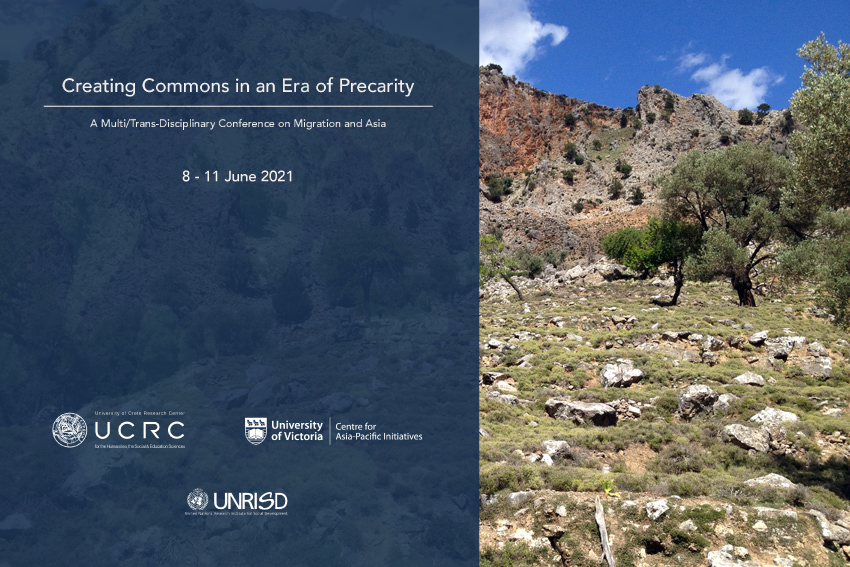Creating Commons in an Era of Precarity: A Multi/Trans-Disciplinary Conference on Migration and Asia
A virtual conference | 8-11 June 2021

This conference is a joint project between the Centre for Asia-Pacific Initiatives (CAPI) at the University of Victoria (UVic) and the University of Crete (UoC) Research Center for the Humanities, the Social and Education Sciences (UCRC). The conference is endorsed by the United Nations Research Institute for Social Development (UNRISD).
Purpose
The purpose is three-fold: to bring together researchers, activists, and particularly graduate students, to share current scholarship while giving space for new knowledge creation; provide opportunities for participants from around the world to network and build alliances; to cross intellectual and physical boundaries to ensure multi/trans disciplinary approaches to knowledge creation.
Background
With more than five years of intensive precarious migration into Greece, much has been learnt regarding the plight of people fleeing settings of war, environmental disasters and poverty. Facing continued economic vulnerability and being the first point of entry for many migrants wishing to reach Europe, Greece has faced particular challenges. Migration, however, is not isolated to Europe; much of the 70 million mobile people throughout the world are located on other continents/regions, including East, Southeast and South Asia. Understanding the conditions of permanent temporariness and precarity facing migrants, both in Europe and Asia is essential to build new approaches to understanding migration. We are interested in how migrants can be viewed as the protagonist, a mobile actor displaying resilience or responses to precarious lifeways, and taking actions contributing to the creation of a “mobile commons,” forging new pathways.
This conference, which will bring 40+ international participants together virtually, is designed not only to showcase expertise in areas of global migration – such as a socioeconomic, political, human rights and social justice issues, but to offer highlight the methodological and theoretical complexities of today’s migrant.
Themes
Key themes include an examination of the connections and common pathways among migrants; the active role of the migrant, both historically and currently, during times of movement as well as temporary settlement; questions related to border security and surveillance and the maintenance and transformations in precarity, the place of new technologies that enable even greater sophistication of policing but also greater opportunity for migrant to migrant connection; and diverse initiatives in the areas of policy advocacy, activism and mobilization as they pertain to the experience of temporariness and strategies to overcome them.
The event will offer a rare opportunity for migration experts from Greece (and other parts of Europe), Canada and parts of Asia to share knowledge, experiences, and strategies as they relate to this complex and pressing global issue.
Tuesday, 8 June 2021
Victoria: 8:00-8:15
Crete: 18:00-18:15
Introductions/ Acknowledgement/ Welcome
- Victor V. Ramraj, Director, Centre for Asia-Pacific Initiatives (CAPI), and Professor of Law, University of Victoria (UVic)
- Georgios Kossioris, Vice-rector for Academic Affairs, Lifelong Learning, International Relations & Outlook, University of Crete (UoC)
- Katja Hujo, Senior Research Coordinator, Social Policy and Development Programme, United Nations Research Institute for Social Development (UNRISD)
Victoria: 8:15-9:15
Crete: 18:15-19:15
Panel 1: Place, Precarities and Securitization
- Chair: Marlea Clarke, UVic Political Science
Place precarity and social integration: changing relationships in South European cities - Vassilis Arapoglou
The presentation discusses two distinct theoretical approaches and geographical framings of precarity (as crisis of social reproduction, as governance and politics) and considers how these enhance our understanding of material and symbolic struggles in the shaping of social integration policies in Southern Europe, especially the strategies of civil society organizations and grassroots initiatives.

Vassilis Arapoglou is associate professor in urban sociology, social inequalities and exclusions at the department of sociology of the University of Crete and member of the administrative boad of UCRC.
Spatial patterns of the refugee settlement in three Greek large cities: Athens, Thessaloniki and Heraklion - Stavros Spyrellis
The presentation is part of a pilot project at the department of sociology university of Crete, which for the first time compares the settlement patterns of immigrants in three major urban centers of Greece. It uses maps to visualize the patterns of the refugee settlement in Athens, Thessaloniki and Herakleion, and to discuss how these relate to wider processes of urban change and how the location of accommodation schemes can address the vulnerabilities of refugees and the welfare needs of the majority of long-standing residents.

Stavros Spyrellis is a Researcher at the National Centre for Social Research (EKKE) and associate at the Géographie-cités laboratory (CNRS). He has worked as temporary assistant, teaching and research in French and Greek Universities. Graduate of the Department of Geography, University of the Aegean, with postgraduate studies at the Université Paris I. His doctoral thesis, entitled Social Division of the Athenian Metropolitan Area, Economic Factors and Educational Issues, was defended in November 2013 (Université Paris VII). His research focuses on the spatial analysis and the mapping of social, economic and educational segregation, particularly in the metropolitan area of Athens.
Refugee Crisis and Refugee Flows from Asia, transformations in Migration Policy and Securitization: The Trend towards Securitization and its Relationship to Precarity, in the case of Greece - Nikos Papadakis and Georgia Dimari
The European refugee crisis of 2015 unveiled the incapacity of member states to act at a united front. Indeed, the innumerous refugee flows from Asia, mainly Syria, combined with unprecedented numbers of migrants from Africa, have prompted a series of diverse member-state responses, profoundly transforming the European migration policy. The underlying procedures that relate to processes such as the ongoing Revision of the Dublin Regulation, the European Agenda on Migration (2015), the contested EU-Turkey Deal (2016) and others, have tilted the migration policy apparatus of the EU towards security. This situation could not have left Greece intact, as it was the entry point for those trying to reach Europe amidst the refugee crisis, resulting in Greece being transformed from a traditionally transit country, to a host one. A major trend that is observed in the Greek case (as well as in the EU) is that refugees tend to be securitized. This means that refugees have been labeled either as a challenge or (even) as a threat from several political elite actors, through the use of speech acts with the referent object being (mainly) societal security. As an outcome and given that Greece was, practically, left alone to handle the refugee/ migration challenge, migration policy has gradually adopted some excessive measures. What are the implications though? Preliminary analysis shows that this practice has a direct impact on the precarity of refugees, contradicting an inclusive approach to migration. Hence, the contribution of this study is twofold. First, it seeks to unpack and present the transformation of Greek migration policies (within the context of the relevant transformations of the EU migration policy), during the post-2015 period. Second, this study, while briefly presenting key-data on the refugee flows (focusing on the ones from Asia), aspires to cast light on the impact, the abovementioned existing transformations have towards the securitization of the refugee crisis and the precarity of refugees.

Nikos Papadakis is Professor and Director of the Centre for Political Research & Documentation (KEPET), Department of Political Science, University of Crete. Deputy Director of the University of Crete Research Center for the Humanities, the Social and Education Sciences (UCRC). Member of the Scientific Board of the National Centre of Public Administration and Local Government (EKDDA). Distinguished Visiting Professor at the AGEP of the Zhengzhou University, China

Dr. Georgia Dimari is a Post Doctoral Researcher at the Department of Political Science of the Univesity of Crete. She explores the transformation of the Greek Migration Policy the post 2015 period. Doctoral Thesis Title: The Securitization of Migration in Greece, 2011 - 2019: Theory and Practice of Desecurization as a Process for the Integration of Migrants in the Greek Society. Her fields of interest are securitization of migration, desecuritization and migration policy.
The essentially contested terrain of human trafficking - Scott Watson
Human trafficking remains a pre-eminent issue of concern globally; and across the political spectrum. Despite shared concerns regarding trafficking, a unified movement to address trafficking has yet to emerge. This paper addresses how trafficking is used by various groups to achieve particular political outcomes, often disconnected from the structures of oppression that contribute to trafficking. The right wing concern with trafficking, as signalled by pizzagate and wayfairgate, is targetted against 'globalism' generally, thus undercutting support for global initiatives to address human trafficking.

Dr Scott Watson is an Associate Professor of Political Science at the University of Victoria, and also serves as the Department Chair. His area of expertise is in the international response to, and governance of, disaster and displacement.
Victoria: 9:15-9:45
Crete: 19:15-19:45
Special Presentation
ESTIA - Support for Accommodation and Assistance to Asylum Seekers and Refugees on Crete - Dimitra Kampeli
Heraklion Development Agency (HDA), as partner of UNHCR and together with its local partners, has undertaken to create reception places for a total number of 1300 fully registered asylum seekers referred by UNHCR and the Greek Ministry of Migration and Asylum. The accommodation scheme is implemented through the rental of 200 private apartments and/or houses on Crete and to provide dignified accommodation and comprehensive assistance including psychosocial support, interpretation, transportation arrangements and referrals, accompaniment to medical, educational and legal aid actors to vulnerable cases of asylum seekers. ESTIA project offers a variety of support services to all beneficiaries, in order to facilitate their stay in Crete and to offer basic integration support to asylum seekers and refugees. Despite the complexity, challenges and difficulties of ESTIA, project’s implementation is considered very successful, resulting to a multi-level inclusion approach, with the active involvement of key stakeholders and local communities. Communication and visibility has been also an important part of implemented actions with main goals to empower people of concern, raise public awareness, activate local support networks, create the best possible conditions for implementing and maximizing achievements and results, highlighting and promoting inclusion, solidarity and support to social vulnerable target groups.

Dimitra Kampeli is the Head of Communication, Transnational Cooperation & Networking Dept of Heraklion Development Agency, in Crete, Greece since 2006. She has an extended experience on the Coordination & Technical Support of European Initiative Projects & transnational or interregional cooperation programmes, coordination of existing networks & cooperation schemes, proposals to European or national calls, dissemination of project results, publication edition, communication & networking activities. She has cooperated as project coordinator with International Humanitarian Organizations such as UNHCR and IOM, national authorities and ministries on the Asylum Seekers and Refugees Accommodation, Supporting Services and Integration Schemes (2017- up to date)
15 minutes
Tea break
Victoria: 10:00-11:30
Crete: 20:00-21:30
Keynote presentation
Watch a recording of the keynote
Reproduction-driven labour migration from China - Biao Xiang
Why do Chinese workers pay up to $8000 agent fees to leave the rising global economic centre, for dead-end jobs overseas? Labour out-migration from China has become driven by needs in social reproduction. Instead of being compelled by unemployment or poverty, people migrate to accumulate savings quickly to buy houses, get married, pay for their children’s education, and arrange medical and social care. These activities sustain and enhance life on a daily and generational basis, and constitute “social reproduction.” Reproduction-driven labour migration results from the monetization of reproduction activities in China, and in turn makes migrants more vulnerable.

Biao Xiang is Professor of Social Anthropology at Oxford University and Director of the Max Planck Institute for Social Anthropology in Germany. Biao Xiang’s research addresses various types of migration – internal and international, unskilled and highly skilled, emigration and return migration, and the places and people left behind – in China, India and other parts of Asia. Through the lens of migration, he has examined a wide range of political economy issues, including state-society relations, labour, social reproduction, and mobility governance. In his recent research he asks why commercial recruitment intermediaries have become so prominent in unskilled labour migration in east Asia – a finding that contradicts the assumption that modern institutions and technologies have a dis-embedding and dis-intermediating effect.
Currently Xiang is re-examining the multifaceted implications of mobility and immobility for societies and individuals, as evidenced during the COVID-19 pandemic. In addition he is studying social debates in China, social research practices in the global South, and new patterns of economic circulation.
Biao Xiang studied sociology at Beijing University, China, and received his PhD in social anthropology from the University of Oxford, UK. He worked at Oxford from 2004. Xiang is the winner of the 2008 Anthony Leeds Prize for his book Global Bodyshopping and the 2012 William L. Holland Prize for his article ‘Predatory Princes’. His 2000 Chinese book 跨越边界的社区 (published in English as Transcending Boundaries, 2005) was reprinted in 2018 as a contemporary classic. His work has been translated into Japanese, French, Korean, Spanish, and Italian.
Wednesday, 9 June 2021
Victoria: 8:00-9:00
Crete: 18:00-19:00
Panel 2: The State and Migrant Labour Governance in the Era of Globalization: The Case of Southeast Asia
- Chair: Leslie Butt, UVic Anthropology
The Prison, the School, and the Panopticon: Transnational Labor Regimes for Migrant Domestic Workers in Indonesia - Andy S. Chang
This paper examines the shifting tenor of intra-Asian mobilities through a comparative ethnography of transnational labor regimes for the deployment of female domestic workers to Taiwan, Hong Kong, and Singapore. At Indodespotic in Jakarta, women enlisted from the hinterland are barred from leaving the camp at all times, subject to a regiment of psychological abuse, cell phone ban, language immersion, and housekeeping chores lasting 13 hours a day, for three to eight months. In Indofam’s classrooms nestled in Ponorogo’s agrarian heartland, women gossip, swipe their cell phones, and put their toddlers to sleep, while instructors inveigle them to learn Mandarin and Cantonese. After seven hours each day, students hop on motorbikes racing to reunite with husbands at home. Meanwhile, situated 2.5 km away, recruits commute daily to Indopanoptic’s headquarters to undergo training, but are required to reside in the dormitory, under managerial supervision, for at least two weeks prior to overseas departure. Trainers adopt the posture of “tiger moms,” mixing reproach with coaxing, daytime restrictions on handsets with nightly family visitations, in a carrot-and-stick instructional style. Indodespotic, Indofam, and Indopanoptic are Indonesian employment agencies that manage migrant labor through what I call prison, school, and hybrid models, whereby compliance is accomplished through coercion, consent, and a combination thereof, respectively. Drawing on 19 months of participant observation in four recruitment agencies in Indonesia, I demonstrate how the sending state’s recently minted credentialing program has operated in tandem with interfirm rivalry to fuel the differentiation of migrant labor regimes. Amid a surging global demand for homecare workers, rural firms, like Indofam and Indopanoptic, exploit their embeddedness in sending communities to woo locals by relaxing labor control and engender profits by externalizing the costs of social reproduction to migrant families. Lacking this spatial advantage, urban firms like Indodespotic retain the prison model to maximize workers’ commitment, while setting up training centers in source communities to vie for labor. As Indonesia has supplanted the Philippines to become the world’s leading exporter of live-in care workers, the multiplicity of transborder labor regimes epitomizes the growing maturation Indonesia’s system of migration governance.

Andy Scott Chang is an Assistant Professor of Southeast Asian History & Politics at Singapore Management University. He is an ethnographer and a sociologist of gender, migration, work, and development. His award-winning research has appeared at Social Problems and Pacific Affairs.
Gendered Borders: The Philippine State’s Management of Outmigration - Maria Cecilia Hwang
In response to the first COVID-19-related death in the country, in February 2020, the Philippine government imposed a temporary travel ban on Filipino citizens traveling to and from China, Hong Kong, and Macao. The New York Times has characterized this travel restriction as “unusual” in that the Philippines not only restricted entry into the country but also prevented the exit of its citizens. This paper argues that, rather than exceptional, mobility restrictions have been central to the Philippine state’s management of migration. First, it illustrates how gender shapes the state’s anti-trafficking emigration border surveillance that restricts the international travel of unaccompanied women constructed as defiantly misbehaving poor, immoral women, and innocent victims. It then demonstrates how women labor migrants who migrate outside of state-sanctioned channels navigate restrictions to their mobility through gendered tactics of passing that reinforce rather than challenge the legitimacy of the state’s emigration regime. In doing so, this paper advances our understanding of the mutual constitution of gender and borders. This paper is based on data collected through ethnographic research – enabled by the unprecedented access I obtained in 2018– on the Philippine Bureau of Immigration’s emigration border control inspection.

Maria Cecilia Hwang is an Assistant Professor in the Department of East Asian Studies and Institute for Gender, Sexuality, and Feminist Studies at McGill University. She is a qualitative sociologist who examines social and political economic processes in globalization. She has published in Signs: Journal of Women in Culture and Society, WSQ: Women's Studies Quarterly, International Migration Review, International Labor and Working-Class History, and Global Networks.
A State of Dependency: Governing Labor Migration in Malaysia - Oanh K. Nguyen
From the inception of its guest-worker program in the mid-1980s through to the contemporary era, the Malaysian state has continued to argue that the employment of foreign labor is merely a stopgap measure for the nation en route to becoming a high-income country. Yet, a stroll through the heart of Kuala Lumpur – with its small but thriving pockets of migrant communities – reveals that contrary to the state’s assertion, Malaysia’s dependency on foreign labor has seeped from the economic sphere into the everyday life of Malaysian nationhood. This paper examines the impact of foreign labor dependency on the governance of foreign labor in Malaysia. Research on the governance of labor migration often focus on the influence of discernably powerful actors and forces, such as business elites or global market forces. This paper, instead, turns its attention to the margins and places the analytical focus on the relationship between migrant workers and the state. In doing so, I treat labor migration governance not as a top-down but as a mutually restrictive relationship developed over generations of temporary migrant workers. Based on nine months of fieldwork in Kuala Lumpur, I argue that foreign labor dependency is not merely an outcome of Malaysian economic calculus but is in itself a political, economic, and cultural context that opens up pathways for migrant workers to affect the trajectory of Malaysia’s migration regime – the laws, policies, and practices that govern the entry and stay of migrant persons.

Oanh K. Nguyen is a PhD Candidate in the Political Science Department at the University of Minnesota, Twin Cities. Her work examines the politics of migration governance in Southeast Asia.
“Responsible” Labor-export in the Midst of Pandemic: The case of the Philippine State - Karen Anne Sun Liao (co-author Yasmin Y. Ortiga)
Amid the ongoing COVID-19 pandemic, media reports have portrayed state restrictions on people’s movement as a response to the threat of infection. Much attention has been placed on how migrant-receiving states have either prevented the entry of migrants or forced their exit from the country. In this presentation, we emphasize the need to examine how migrant-sending states also respond to the pandemic, often beyond the simple mitigation of the virus. We discuss two state-led initiatives within the Philippines, one of the largest migrant-sending nations in the world: 1) a ban preventing the departure of Filipino nurses bound for hospitals overseas; and 2) a national government campaign to repatriate Filipino overseas workers who lost their jobs abroad, despite strong resistance from local government units within the country. While meant to mitigate the spread of COVID-19, such policies reflect the sending state’s drive to project an image of a ‘responsible’ labor-exporting state that can protect its citizens in emergencies. Yet, in the process, these policies immobilized thousands of Filipino workers within their own country, with aspiring nurse migrants stuck at home and migrant returnees confined in extended quarantine periods, with many barred from returning to their home communities. The Philippine case highlights how state attempts to produce an ideal image of themselves in times of crisis can inadvertently create prolonged immobilities that further disrupt people’s lives.

Karen Anne S. Liao is a PhD candidate at the Department of Geography of the National University of Singapore. She is interested in the social and political geographies of migration in Asia, and is currently studying labour migrant repatriation and return during crises and emergencies. She has previously conducted research on Filipino highly skilled and professional migrants in Singapore, and has published in Geoforum and Migrations Société.
Migrant autonomies in Singapore’s Migrant Domestic Worker (MDW) Industry - Lynn Ng
Following an Autonomy of Migration (AoM) approach, this paper uses the case of Migrant Domestic Workers (MDWs) in Singapore to argue for a reconceptualization of the ‘political’ that begins from a perspective of migrants as protagonists in regimes of (im)mobility. I compare and contrast my research findings on MDW actions/strategies in Singapore with that of the ‘mobile commons’ concept. My findings suggest that the personal agency embodied in the acts and strategies of MDWs must be understood as contextualised in an asymmetrical live-in employment relationship that does not allow for digital participation as a given. My paper does not intend to evaluate the merits and limitations of this concept but rather explores the possible variations that a ‘mobile commons’ as an expression of community resistance can take in a unique situation of live-in employment. The questions that are of interest are firstly: What does the ‘mobile commons’ for MDWs in Singapore look like? Importantly, recurrent studies show that MDW practices are deeply but not exclusively conditioned by structural incentives. Hence a follow-up question: How do the actions and strategies of MDWs in Singapore complicate or nuance our understanding of the ‘mobile commons’? The state’s live-in requirement emerges as the most significant structural factor in (I'm)mobility of MDWs, by implication the arenas they access for political practice.

Lynn is currently a PhD Candidate in Political Science at UVic under the supervision of Dr Feng Xu. Prior to this, she completed a BA (Hons) in Geography at Durham University (UK) and an MPhil in Development Studies at the University of Cambridge (UK). Her research focuses on migrant care workers in Singapore and Taiwan who care for the elderly in institutional and home settings. The current paper explores the political strategies and practice of home care workers in Singapore drawing on the relevant themes of this conference.
Victoria: 9:00-10:00
Crete: 19:00-20:00
Panel 3: Activist Organizations and Migrant Supports
- Chairs: Anureet Lotay, UVic Anthropology, and Lynn Ng, UVic Political Science
Searching for the Commons and Asian Constituency Groups in Transnational Solidarity Organizations: A comparative European perspective - Angelos Loukakis (co-authors Stefania Kalogeraki, Chara Kokkinou, and Maria Kousis)
With migration waves from Asia increasing in the past decade, most works focus on how civil society has responded. However, there is a lack of systematic studies on the solidarity approach they follow and how this is related to constituency groups of Asian origin. Using primary systematic data of the TransSOL (EC Horizon 2020) research project, this presentation first examines to which extent Transnational Solidarity Organizations which focus on migration and refugees have a Commons oriented solidarity approach. Are they more mutual help oriented or, are do they adopt a service oriented top down solidarity approach? Secondly it examines to which extent these organizations, most of which are based in European countries, address needs of constituency groups from Asia, compared to other groups. The findings aim to shed light on major features of Commons oriented transnational solidarity organizations as well as the groups they support in specific national contexts.

Angelos, is post-Doc researcher at University of Crete Research Center for Humanities, Social and Education Sciences (UCRC). His PhD thesis Solidarity groups, actions and claims during the economic crisis in Greece, investigated the political and social consequences of the Greek economic crisis. Other research interests include solidarity, collective action, social and environmental movements. He was a researcher at the EU funded projects EURYKA, TransSOL and Livewhat as well as in a SNIS funded project called “Social and Solidarity Economy, Urban Communities and the Protection of Vulnerable Groups in Times of Crisis”. Moreover, he has participated in the project Greeks, Germans and the Crisis, which investigated the attribution of responsibility about the economic crisis in the Greek, German, and international press. He publish extensively mainly in English journals and collective volumes.

Stefania Kalogeraki is Associate Professor of Quantitative Methods in Sociology and Social Demography at the Department of Sociology, University of Crete (Greece). Her main research interests focus on quantitative comparative social research, questionnaire design, social demographic analysis and mixed method designs.

Chara Kokkinou is a PHD student in Sociology of Work (University of Crete) holding a MSc in Sociology (UoC, School of Social Studies), a MA in Philosophy (UoC, School of Letters) and a Bachelor in European Culture (Hellenic Open University, School of Humanities). Research associate in research projects at UCRC (UoC Research Center for the Humanities the Social and Education studies).

Maria Kousis (MA, PhD, The University of Michigan, 1984) is Professor of Sociology and Director of the University of Crete Research Centre for the Humanities, the Social and Education Sciences (UCRC). She was coordinator or partner in European Commission projects including TransSOL H2020
Worker Centred and Migrant Justice Advocacy: The Global Alliance Against Trafficking in Women (Bangkok, Thailand) - Annalee Lepp
My presentation focuses on the worker centred and migrant justice advocacy work of the Global Alliance Against Trafficking in Women (GAATW), with which I have worked since the late 1990s. It was established in 1994 and its International Secretariat is in Bangkok, Thailand. GAATW is comprised of 80 non-governmental organizations in Africa, Asia, Europe, Latin America and Caribbean, and North America which include migrant rights organizations and self-organized groups of migrant workers, domestic workers, sex workers, and survivors of trafficking. GAATW is unique in the global anti-trafficking arena in that, since its establishment, it has offered a powerful critique of the dominant anti-trafficking framework through participatory action research and advocacy, as well as emphasis on state and NGO accountability for the harms caused by anti-trafficking interventions and campaigns.

Annalee Lepp was trained as an historian. Dr. Lepp's historical research has focused on Canadian gender, family, and legal history and most specifically the history of marital breakdown and domestic violence in nineteenth- and early twentieth-century Canada.
Dr. Lepp's other main area of research concentrates on trafficking in persons, transnational labour migration, and irregular border movements in the global and especially the Canadian context. Dr. Lepp was a co-founder in 1996 and is the current director of the Global Alliance Against Traffic in Women (GAATW) Canada, a member organization of GAATW whose international secretariat is located in Bangkok. Work in this area has included human trafficking crisis intervention, advocacy, and acting as the principal investigator for a number of funded collaborative research projects on human trafficking and irregular cross-border movements from a human rights perspective.
Chasing rights, chasing funds: exploring forced and strategic personal and ideological mobility of sex workers rights organizations in India and in Canada - Claudyne Chevrier
It has always been difficult for sex workers-led organizations to secure resources to provide life-saving and community-building services to their members, often counting among the world’s most precarious workers. The last two decades have seen the emergence of challenging competition with lavishly financed Christian anti-trafficking organizations enacting programs and supporting policies and legislation often harming sex workers and migrant sex workers. In addition, the ever-shifting funding “priorities” push well-established Mysore, India-based organization Ashodaya Samithi to repeatedly alter its services to adapt to a fluctuating financial terrain. In Canada, emerging Sex Workers of Winnipeg Action Coalition (SWWAC) gets creative to continue its crucial advocacy in a setting where funds for services acknowledging the diversity of experiences in the sex trade are almost inexistent. I explore the collective and individual precarities of sex workers rights activists and the services they offer, and document the sometimes challenging personal, ideological and geographical forced mobility resulting from these contexts.

Claudyne Chevrier is a feminist community organizer who completed a PhD in Community Health Sciences in the midst of the COVID-19 pandemic. Her specific research interests lie in the interactions between social determinants of health, systems of oppressions, social inequalities and the accessibility to quality health care, particular in relations to gender iniquities. She is a proud founding member of the Sex Workers of Winnipeg Action Coalition, which advocates for sex workers rights in Winnipeg, Treaty One, since 2014. Her love for evidence-based policies is only rivaled by her aggressive interest in felines and social justice.
The role of acculturation attitudes and social support in anxiety and depression of Indian immigrants’ in Greece - Evangelia Kateri (co-authors Evangelos Karademas, Georgios Tsouvelas)
In the present study, we have examined the factors of acculturation attitudes and social support that may impact Indian immigrants’ psychological well- being. The participants of our study were first generation Indian immigrants, residing in Crete, Greece (N= 114). It was expected that integration and separation, as acculturation attitudes, would enhance social support from friends and family and minimize the risk for anxiety and depression, enabling Indians to maintain some elements of their culture of origin. Furthermore, it was expected that the indirect effects of integration and separation on psychological well-being would be through social support and that social support would moderate the same relationships as well, protecting immigrants from anxiety and depression. The results have showed that separation was positively related to social support and negatively to depression through social support from friends and family. Integration and assimilation, on the other hand, protected immigrants from depression and anxiety respectively, when immigrants received social support. These findings suggest that Indian immigrants' social support could ameliorate the negative effects of acculturation stress on their psychological well-being.

Evangelia Kateri's academic studies: Degree in Psychology (2000), Postgraduate Degree of Specialization in Clinical Psychology (2003), PhD Degree (2011). Teaching Experience: Adjunct Lecturer at Department of Psychology (Univeristy of Crete). My reserach interests are related to the role of culture in well-being.
30 minutes
Tea break and breakout room discussion
- Topics for discussion: local, personal, care, and specific group issues
Victoria: 10:30-11:30
Crete: 20:30-21:30
Film Screening and Q&A
- Moderator: Duncan Chalmers, Former Refugee Education Facilitator, Karenni Social Development Center, in conversation with the film's Executive Director/Co-Producer Ansley Sawyer
“Like We Don't Exist” - Ansley Sawyer
Today, thousands of people live in refugee camps along the Thai-Burmese border, displaced from decades of relentless civil war at the hands of the Burmese military. The Karenni are an ethnically diverse community that has survived the ongoing ethnic violence and mass displacement from their homeland, located historically between Thailand and Myanmar (formerly called Burma). After 70 years of conflict -- the longest ongoing civil war in the world -- the Karenni face an uncertain future as a refugee community along the Thai-Burmese border.
watch the film

Ansley is a nomadic film producer. Her collaborations with director Brandon Li's "Nomads of Mongolia" and "Hong Kong Strong" were Vimeo Staff Picks, and have been featured on BBC, National Geographic, TEDx, Smithsonian, Sony Alpha Universe, and Upworthy. Her award-winning film "Like We Don't Exist" is her most recent experiment in film as advocacy, and has been shown to over 15,000 people in universities, churches, and schools in 15 cities over the last year. She is an avid traveler, singer, sailor, and storyteller.
Thursday, 10 June 2021
Victoria: 8:00-9:00
Crete: 18:00-19:00
Panel 4: Migrant Workers and Entrepreunership
- Chair: Catherine Costigan, UVic Psychology
From Manila to Athens: Sustaining the Movement through the creation of Mobile Commons - Dimitris Parsanoglou
Migration from Philippines is significant for Greece's immigration history for at least two reasons: it is one of the oldest occupying since the 1980s a significant part of migrant flows; it is strongly feminised providing evidence of interesting gendered patterns of mobility. In this presentation, I will reflect upon collective experiences and collective actions that demonstrate how the construction and dynamics of mobile commons can generate and sustain mobility. Based on the example of Athens inner city and drawing on empirical research with Filipino migrants, I will examine the processes where their will, agency and praxis are interwoven with precarious spaces. The generation, maintenance, evolution, even erosion of mobile commons are consequential of social processes and struggles driven by subaltern and precarious subjects, migrants and non-migrants alike, leading to broader spatial and social transformations.

Dimitris Parsanoglou is Assistant professor at the Department of Sociology at the University of the Aegean. He is also a Senior researcher at the Department of Social Policy at Panteion University of Social and Political Sciences.
Creating Commons: The Dollar Store Connection - Qian Liu and Helen Lansdowne
This paper offers a preliminary discussion of the strategies adopted by Chinese migrants in Greece to successfully set up and run ‘dollar stores’, and how such strategies can be seen as integral to, not only the success of the business ventures, but as a system of creating commons. We focus on migrants from Zhejiang province, which is known as the world’s largest wholesale market of small commodities. Strategies, such as constructing networks between the sojourner and their home villages through accessing labor and resources, and in turn setting up structures in the host country to aid and abet these networks, are methods used to begin and run a business. Such approaches also contribute to ways of creating Chinese communities in the host country, creating a sense of community and togetherness which not only ensures the survival of the dollar stores and the manufacturing of goods in Zhejiang, but it also creates a set of rules and social ordering within and out of the communities that may be more influential than the formal legal system in the host country. Being part of the network, these Zhejiang business owners and workers are expected to support each other and community activities in various ways in order to gain “the ticket of belonging”. From a legal pluralism lens, we investigate the influential roles these community rules play in creating commons. We ask the difficult question of “creating commons for whom” by analyzing how the Zhejiang communities occupy the “territory” and exclude others who are deemed not to belong.

Qian Liu completed her Ph.D. in Law and Society at the Faculty of Law, University of Victoria in 2020. Her research interests include legal consciousness in Chinese societies, legal pluralism, feminist legal theory, postcolonial feminist theory, sexual orientation and the law, qualitative research, and gender issues in China. Dr. Liu is the author of several articles including “Legal Consciousness of the Leftover Woman: Law and Qingin Chinese Family Relations,” which won the 2019 Asian Law and Society Association Graduate Student Article Award. She is currently working on a monograph on the impact of the interaction of state law, family relations, and social expectations on Chinese leftover women’s choices in marriage and childbearing.

Helen Lansdowne has a BA and an MA in Pacific and Asian Studies from UVic and has been with CAPI since late 1998. She brings expertise in rural China state-society relations. Her most recent area of study includes mainland Southeast Asia, with a particular focus on development and gender.
Migrant Entrepreneurship from Asia and its effect in local small business - Valia Αranitou and Iris Polyzou
One of the critical characteristics of Greek society is the large number of very small businesses. Also for more than 20 years - since the country was transformed from a push to a pull country of migration - many immigrants have set up small trade or food businesses mainly in the center of Athens. This paper will examine the interaction of this activity with local entrepreneurship.

Valia S. Aranitou, is an Associate Professor at the Department of Political Science of the University of Crete, Greece where she teaches political sociology and political economy. In addition, she is the Director of the Research Institute of Greek Commerce and SMEs, the Institute of The Hellenic Confederation of Commerce and Entrepreneurship.

Iris Polyzou completed her post-graduate studies at the School for Advanced Studies in the Social Sciences (EHESS) in Paris and her doctoral thesis in joint-supervision at the School of Architecture, National Technical University at Athens, and the Department of Geography at the University of Poitiers, Laboratory MIGRINTER, in 2014. She is a recherche associate at the French School at Athens and has completed the National School of Public Administration (ESDDA). Her research focuses on the migratory phenomenon within the urban space.
Structured mobility: Asian migrant workers in the Mauritian garment industry - Marlea Clarke
The dismantling of the Multi-Fibre Arrangement (MFA) in 2005 brought both new opportunities and competitive pressures for garment producers in Africa. Some African countries such as Mauritius, have responded to increased competition by relocating factories to lower wage countries and reducing labour costs by hiring migrant workers. Migrants initially made up a small percentage of the Mauritian workforce and were brought from a range of Asian countries, such as China, Bangladesh and India. For instance, in 2007 migrant workers made up only about 27% of the labour force in the garment and textile industries. Labour shortages and other employment challenges in the sector, combined with regulatory provisions that facilitated the use of migrants, resulted in a dramatic increase in the use of migrants. By 2016 over 50% of workers in the sector were migrant workers, mostly from Bangladesh. Despite attempts by the Mauritian government to better regulate the use of migrants and improve monitoring of recruitment agencies, reports of poor working and living conditions persist. This paper will explore these issues by drawing on recently completed primary research. Our particular focus is dormitories and the role these particular on-site housing arrangements play in both facilitating mobility for garments workers (rural to urban, one country to another and between employers) and immobility (workers’ visa and accommodation are tied to the company).

Dr. Clarke specialises in comparative politics and the Global South (particularly Africa). Her broad research interests are globalisation, employment and labour market restructuring from a comparative and feminist political economy perspective, regional (African) clothing production networks, and south-south labour migration and investment (specifically Asia-Africa). Her current, SSHRC-funded, five-year research project focuses on changing patterns of trade and global production of clothing, especially regional production networks and labour standards in sub-Saharan Africa. This research includes an exploration of the role of Asian migrant workers in clothing production in Lesotho and Mauritius, and Asian investment in African clothing and textiles industries.
A history of cross-racial ties, law and migration in the era of Chinese exclusion - Mary Anne Vallianatos
Bibianne Yii, Charles Moore and their six children arrived in Victoria, B.C. from Beijing in 1885--the first year of Canada’s anti-Chinese immigration law. This ‘Chinese head tax’ inaugurated a system of highly selective migrant screening based on racial ideas and the presumption of illegality. The Moore-Yii family, as an interracial Anglo-Chinese family, were required to pay the head tax for each member--except for Charles who was described by the local press, and by the Prime Minister, as an ‘English gentleman.’ This paper relies on the archival traces left by the Moore-Yii family as they challenged the head tax, and eventually in 1887, brought about a new law that lifted the restrictions against Chinese women married to white men and their children. I document this untold history and the intersecting questions of race, gender, and empire at issue in the case of the Bibianne Yii. Patriarchal legal ideologies would shape Yii’s experience of the law, for her status as a “C.I.40” “exempt class” was dependent upon her marriage to a white man. In telling this history, I bring new light to the history of Chinese exclusion, and the nuanced relationship between law and Asian racialization more broadly.

Mary Anne Vallianatos is a PhD candidate with the Faculty of Law at the University of Victoria. Mary Anne’s research lies at the intersection of critical race theory, law and empire, and the legal history of anti-Asian racism. She holds a Canada Graduate Scholarship from the Social Sciences and Humanities Research Council; and is an incoming Schulich Fellow at Dalhousie University for 2021-22.
30 minutes
Tea break and breakout room discussion
Victoria: 9:30-10:30
Crete: 19:30-20:30
Panel 5: Flexible Protagonist
- Chair: Christina Karakioulafi, UoC Sociology
Temporary Movement, Temporary Job: “Flexibility” in Chinese Food Delivery Workers at the Technology-Driven Economy in China - Xue Ma
In earlier September of 2020, an article about food delivery workers in China went viral around the Chinese media space (Lai 2020). This article investigates the details of food delivery workers’ delivering speed against the algorithm’s estimates of delivery time, which reflects a brutal reality of this highly risky job in their movement of delivering food from one place to another. Discussions about food delivery workers suddenly get under the spotlight, and the two biggest food delivery platform companies also responded with a promise to modify their product design (Liu 2020). Given the prevalence and rapid emergence of food delivery industry in China, and the growing of this temporary job field such as food delivery workers in most urban spaces in China, I hope to go further beyond this media article’s discussion about technology and labor to understand the emergence of temporary jobs as such and the changing labor relationships in the technology-driven economy. By investigating in details about the work condition, recruiting and hiring system, as well as the workers’ motivations for becoming food delivery workers, I argue that the platform economy such as the food delivery industry further exploit migrant workers’ labor value with its algorithm design and subcontracting system. In current technology-driven economy and urbanized Chinese society, rural migrant workers have no choice but to take “flexibility” as their opportunities to sustain livelihood in their marginalized position. However, this “flexibility” is the very nature and result of how the dominant power (of economic and social hierarchy) take advantage of the marginalized rural migrant workers.

Xue Ma is a doctoral student in the department of anthropology at University of Victoria. Her research interests lie broadly in economic anthropology, with particular interests around inequality, debt and digitalization.
Developments and features of alternative work arrangements in Greece since 2005: The case of Asian and non-Asian migrants - Daphne Nicolitsas

Daphne Nicolitsas is, since Feb 2014, an Assistant Professor at the Department of Economics of the University of Crete. Prior to that she worked in economic policy related jobs and in the financial sector. Her main research interests lie in labour economics and in industrial organization, fields in which she has publications in international journals.
Social solidarity economy and Asian and non-Asian migrant integration: Developing relations of care - Haris Malamidis
In the aftermath of the refugee “crisis”, the integration of Asian and non-Asian migrants appears in the public debate. The traditional picture of Greece as a reception and transit but not destination country has produced a fragmented integration framework since the 1990s. By adopting a critical stance, this study has a dual scope: on the one hand, it reveals the value landscape of integration policies in Greece, and on the other hand, it suggests an alternative framework of care, as this is introduced by social solidarity economy practices. More precisely, the first part of our inquiry sheds light to the double role of integration: meaning an academic concept and a policy instrument. In this respect, it shows how this dual role of integration has shaped the unequal and contradictory character of integration policies in Greece. The main part of the study draws its attention to the value-basis of integration policies and introduces an alternative bottom-up perspective on integration, as this has been developed during the last decade through social solidarity economy practices. As such, it explores practices of inclusion of vulnerable populations and suggests a different understanding of integration through relationships of care.

Haris Malamidis is a post-doctoral researcher working on migrants’ integration and social and solidarity economy at the department of Sociology at University of Crete and research fellow at ELIAMEP for the AMIF project ‘ATHENA-Approaches to valorise the high entrepreneurial potential of migrant women to contribute to their social and economic integration’.
Use of an arts-based, peer-mediated Story Board Narrative Method with forced migrant youth to explore a decolonial, youth-led approach to understanding and psychosocial support - Jessica Ball
An innovative, arts-based, peer-mediated Story Board Narrative method of data collection and psychosocial support for forced migrant youth is described. Examples are provided illustrating the process and effects of the method in ongoing engagement with community partners in Malaysia and Thailand serving forced migrant adolescents . The method centres meaning making by youth about their forced migration journey and adaptation in often hostile and precarious conditions while in transit. As a research method, primary data are youth’s narrative accounts of the experiences depicted on their Story Board, and the issues raised and discussed by peers after youth’s Story Board narrations. As an intervention, peer mediation over successive sessions appears to generate self-insight, compassion stemming from recognition of collective suffering, and sustainable psychosocial support. The method shifts authorship of useful questions, key concepts, and interpretation from outside investigators to young migrants themselves. As part of a decolonial, participatory design, current engagement with partners in Thailand is exploring potential for mutual learning between academic and community partners. Community partners are supported to adapt the method for their own context and purpose while strengthening their expertise with optimizing the tool in preparation for sharing it with others. The needs, opportunities and tensions of this paradigmatic shift from more to less Western dominated approaches to research and practice will be discussed.

Jessica Ball, MPH, PhD, is a professor of Child and Youth Care at the University of Victoria, Canada. She has worked as a researcher and consultant for international organizations, governments, and community organizations in Asia, North America and Africa to develop and reform policies affecting the well-being of children, youth and families, and to strengthen local capacity to implement policies. She currently leads a multi-sited investigation of the experiences of forced migrant youth in Southeast Asia. She has published over 140 peer reviewed journal articles, chapters, and three books. Her achievements have been recognized by numerous national and international awards.
Victoria: 10:30-11:30
Crete: 20:30-21:30
Film screening and Q&A
- Moderator: Regina Mantanika, UoC Sociology, in conversation with the film's Co-Director Io Chaviara
“Feeling of a Home” by Io Chaviara and Michalis Kastanidis
Idomeni, in 2016; In this small village on the Greek-Macedonian border, an old lady recounts stories about locals who crossed the borderline and never came back. While her narrations reconstruct the History of the border, some Palestinians from Syria, living in the refugee settlement that has been built right next to the village, decide to set up a kindergarten. Thus, instead of waiting passively for the border to open, they exist in the present, they envision the future and they create conditions that bring them closer to a feeling of a home.
watch the film

Io Chaviara is a visual artist and a Phd candidate at Social Anthropology Department of Panteion Uninveristy. She has taken place in international exhibitions she has been co-curating workshops and documentary festivals in Athens and Beirut. Her artworks consist of essays, lectures, performances, installations, curating projects and documentaries.

Michalis Kastanidis is a film-maker and co-founder of Fabula Productions based in Athens, Greece. He has studied visual anthropology and ethnographic film in Barcelona (UB).
Friday, 11 June 2021
Victoria: 8:00-9:00
Crete: 18:00-19:00
Panel 6: Institutionalizing Precarity
- Chairs: Maria Mexi, Research Fellow, The Graduate Institute of International and Development Studies, Geneva, and Visiting Fellow, UNRISD, and Katja Hujo, Senior Research Coordinator in the Social Policy and Development Programme, UNRISD
Domestic Workers in the Arabian Gulf: Precarity, reality and resistance - Claude Beaupre
There is a growing body of sociological and feminist literature about migrant domestic workers, documenting the re-assertion of domestic work as care work, an irreplaceable contribution to the well-functioning of society (Federici, 2016; Parrenas, 2001; Ehrenreich & Hochschild, 2002, Sassen, 2002; Beneria, 2008). With various levels of reception and corresponding mobilisation, this labour re-assertion has been mostly prevalent in Europe, parts of Asian and North America; with little to no obvious impacts within Gulf countries. I would argue, however, that the perceived preclusion from the above domestic care mobilisation in no way implies that no efforts have been made by migrant domestic workers in Gulf states to improve their labour and living conditions, but that the conditions in which they are employed makes it as such that they are unable to band together due to the stern policing and isolating norms that prevail. Instead, their resistance is predominantly situated within the (im)mobile confines they are subjected to in what is called acts of everyday resistance.

Claude Beaupre is a joint ph.d student in Political Science at the University of Victoria, Canada, and Contemporary History at the University of Strasbourg, France. She has an MA in Public and International Affairs from the York University, Canada, and an MA in History of International Relations from Science Po Strasbourg, France. Her current work focuses on the links between media coverage and migration discourse in Canada.
Creating Commons in Europe through Labour Migration: Enablers and Barriers - Simone Baglioni
The paper discusses labour migration in Europe by focusing on how migrants interact with social, legal and policy contextual features and on how they manage to turn challenges into opportunities and to adapt to new environments. It will also discuss how newcomers by adapting and pushing for changes in their community of settlement contribute forging paths of 'social and bottom-up' citizenship which could also be portrayed as 'new commons'. The paper builds on the work carried out in the Horizon 2020 project SIRIUS (www.sirius-project.eu).

Simone Baglioni is professor of Sociology in the Department of Economics and Management at the University of Parma, Italy. He is the coordinator and PI of the Horizon 2020 project SIRIUS investigating issues of labour market integration of migrants and refugees across seven European countries.
The impact of humanitarian agencies and the social and cultural networks in the process of settlement. The case of Pakistanis and Afghans in Athens: a comparative approach - Ervin Shehu
The migrants and refugees from Pakistan and Afghanistan follow multiple modes of settlement in various types of urban accommodation, which interrelate with the fields of protection, sociality, education, medical care, religious practice and labor. The Humanitarian Governance has a differentiated impact on their daily life, however, the migrants and refugees interact at the same time with the local society in relation to language learning and informal education, the asylum process and formal or non-formal access to the labor market. Finding support in the existing ethnocultural, family, and religious migrant networks and spaces of sociality as mechanisms of mediation between the migrants and the local society, new cultural values and the cultural reconfigurations are being adopted at the place of settlement. Apart from the enhancement of the above networks, migrants demand their visibility in public space (squares, streets, mosques, stores) and their active involvement in informal spaces of sociality.

Ervin Shehu is an anthropologist, PhD Candidate at the Department of Social and Historical Anthropology, University of the Aegean. His research interests focus on the social and cultural networks of asylum applicants, immigrants and refugees from Pakistan and Afghanistan in Athens , applying the methodology of the comparative ethnographic research. He has published several articles in reference to inclusion and everyday integration, settlement and the modes of mediation that take place in the process of integration.
“Which way home”? A thematic analysis approach to understanding belonging of forced migrant youth in Malaysia - Rashin Lamouchi
The end of the year 2020 marked a record high of 79.5 million forced migrants globally. This number represents the displacement of one out of every 10 people in the world. Of the 79.5 million forcibly displaced persons, 30 – 34 million are under 18 years of age. It is estimated that there are 272 million international migrants – around 3.5% of the world’s population- and about half of these are youth. Forced migrant youth are spending a very formative period of their lives in precarious situations, often without access to basic child and human rights including healthcare and education. There is a wealth of literature on the determinants of belonging as factors in migration outcomes. It is generally understood that belonging is crucial to youths’ development and physical and mental health. However, little is known about forced migrant youth, their views on migration and their sense of belonging while temporarily living in a country of refuge. This study explores the experiences of forced migrant youth in Malaysia and the impact of forced migration on their sense of home and belonging.

Rashin Lamouchi is a graduate student in the Child and youth care program at the school of Human and Social Development, University of Victoria, BC, Canada. Lamouchi started her work with children as an early childhood educator and became involved in researching issues that impact children and youth experiences during her second BA in Early Childhood Leadership program. Her current research looks at the sense of home and belonging of forced migrant youth who are in transition and temporarily reside in in Kuala Lumpur, Malaysia. Lamouchi’s research interest includes refugees’ mental health, sense of belonging, and home-making while in limbo.
30 minutes
Tea break and breakout room discussion
Victoria: 9:30-10:30
Crete: 19:30-20:30
Panel 7: Immigrant Identities
- Chair: Aspasia Chatzidaki, UoC Department of Primary Education
Negotiating Diasporic Identity: Gender and Family in the Indian Diaspora - Anureet Lotay
The Punjabi-Canadian diaspora in British Columbia is one of the largest in Canada and the world. It offers a unique opportunity to explore the impact of migration and diasporic lifeways on the health and reproductive lives of Punjabi-Canadians who must negotiate belonging within the Indian community, and within wider Canadian society, in their practices around reproduction, gender, family, and media. I use theories of diaspora, identity and belonging to show how diasporic Indians inhabit liminal spaces where memory and ideology collide, and cultural and political terrains are contested, to fashion a multiply-constituted ethnic identity. Focusing on the results of my doctoral research, I examine the everyday migrant subjectivities and practices that allow diasporic Indians to be “here”, “there” and in-between; how families are constructed in the diaspora; and, how health-related perceptions and reproductive experiences can define migrant belonging and identity.

Anu Lotay is a PhD candidate in the department of anthropology specializing in topics of diaspora, race, health and reproduction. Born in India, she is a settler on the unceded Lkwungen & W̱SÁNEĆ Territories where she works as a community researcher on local issues.
Mapping Indian immigrant high school students’ science identity - Emily Michailidi (co-author Dimitris Stavrou)
Students from non-dominant cultural and low economic background are usually underrepresented in the fields of science and technology. Growing evidence supports that this underrepresentation is associated with the incompatibility between the cultural perspective of science and the community identity of the aforementioned groups. Science identity constitutes a threefold construct that encompasses the individual’s ability to understand the content of science (competence), the ability to adequately apply scientific practices (performance) and the perception of an individual about him/herself but also the recognition by others as a "potential scientist" (recognition). The present study aims to map Indian immigrant high school students’ science identity with a special focus on their self-positioning in relation to science. Data are collected through artefact-assisted interviews with five Indian immigrant students of the vocational high school of Rethymnon. Interviews are focused on Indian students’ self-perception of their scientific competence and adoption of specific scientific practices, as well as their ambitions regarding science. Particular emphasis is placed on the way identity characteristics as race, ethnicity and religion intersect with and influence science identity.

Emily Michailidi is a Lecturer in Science Education at the department of Primary Education of the University of Crete. Her PhD focused on teacher training on implementing modules on cutting edge research topics with the support of mentor-teachers. She was awarded a post-doctoral fellowship from the Greek State Scholarships Foundation for research on students’ science identity. Her research interests focus on in-service teacher training, science mentoring and nanotechnology education.
Traces and Residues of Migrant Boat Journeys: Reading the MV Sun Sea and Komagata Maru through a liberal economy of affirmation and forgetting - Jonathan Nash
The migrant boat continues to configure prominently into representations of precarious migrants throughout Euro-America. While scholars have carefully attended to ambivalent representations of migration (Hegde 2016, Nail 2015, Woolley 2014, Farrier 2011, & Shemak 2010), more can be said about the migrant boat itself, which remains an always present figure in the history of precarious migration. This paper investigates this figure through two different boat journeys to Canada: the Komagata Maru and the MV Sun Sea. While the Komagata Maru has been commemorated and the subject of two apologies from Canada, its reception of the MV Sun Sea and Ocean Lady contradicted its apology and commitment to newcomers. Drawing from Lise Lowe’s theorisation of liberalism, this paper demonstrates how the Canadian nation-state concealed its anti-migrant responses to affirm its liberal values as a welcoming place for hard-working immigrants. Reading representations of the MV Sun Sea and Komagata Maru across Stephen Harper’s apology and 2011 re-election campaign, this paper argues that the boat reveals the contradictions and incoherencies of the liberal nation-state. This paper advances understanding of how other economies of representation of migrant objects, other than the refugee body, affect state policy-making and public receptions of precarious migrants.

Jonathan Nash is a PhD Candidate in the Department of English and Cultural, Social and Political Thought program at the University of Victoria. His SSHRC funded research attends to how contemporary refugee writing is creating transnational links and connections between differing histories and experiences of migration.
Promoting social inclusion through narratives and multiple identities: the example of the Erasmus+ project BackpackID with Asian and non-Asian students - Konstantinos Sipitanos
The 21st century is characterized by high mobility and cultural superdiversity. Schools face the challenge of meeting the needs of a highly differentiated population and shape future citizens in the necessary inclusive democratic values. In order to create an inclusive educational environment for all, for domestic population, for immigrants who come from Europe and move around it, from other parts of the world and especially Asia (e.g. Syria, India, Pakistan and Afganistan) an Erasmus+ project was organized in which the concept of “multiple identities” enhanced the exchange and sharing of narratives. The emergence of students’ multiple identities refer to a series of activities that are developed in order the students (migrants and non migrants, refugee and non refugee) to bring, share, compare, analyze and deepen their own identities and discover that they have more commonalties and differences with others than they though before. In these activities the students’ enrich their identities through the identification of the different elements/characteristics that (dis)connect students from different regions, religions, ethnicities, social, economical, religious and cultural backgrounds. In this presentation specific educational examples will be provided mainly from Asian students’ narratives.

Konstantinos Sipitanos holds a MA degree in Linguistics (2016) and a PhD degree (2020) in Language Teaching and Participatory Research Methodologies from University of Crete (UoC). He works as researcher and adjunct faculty teaching staff in the Departments of Philosophy and Social Sciences in the UoC and as a fellow tutor in the Postgraduate program Contemporary Linguistics Tensions for Educators in the Hellenic Open University. He has published articles in EAR Journal, Punctum International Journal of Semiotics, IJEL Studies EURO-JCS, Social Semiotics and a chapter in Cambridge Scholars Publishing. He has also participated in research projects funded: a. by EU under the Erasmus+ actions such as CICADA and BackpackID and b. by state organizations such as “Disseminating Democracy in Schools” and the “Principals discourses in school settings”. His main research interest concern: literacies (media, critical and digital) literacy, social semiotics, critical discourse analysis, participatory action research and students’ voice
Victoria: 10:30-11:30
Crete: 20:30-21:30
Closing Reflections:
- Rapporteurs: Feng Xu, UVic Political Science, and Christina Georgiadou
- Closing Remarks: Maria Kousis, Professor of Sociology and Director of UCRC, and Helen Lansdowne, Associate Director of CAPI



